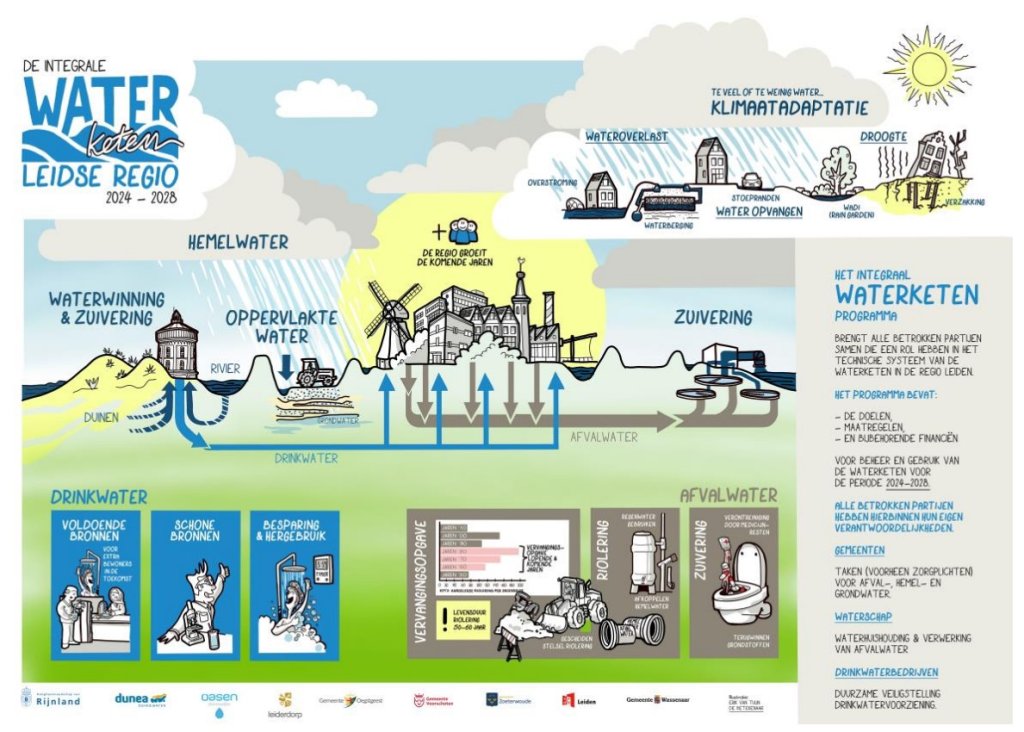Integrated water chain program
On March 26, 2023, the City Council adopted the Intergral Water Chain Plan (IWkp). This program deals with the water chain in the Leiden region. The municipalities of Leiden, Leiderdorp, Oegstgeest, Zoeterwoude, Wassenaar and Voorschoten are making this plan together with the Rijnland Water Board. The plan applies for 2024-2028 and succeeds the 2019-2023 program. Drinking water companies Dunea and Oasen are also participating in this program. It is important to do this together. How we treat water together does not stop at the municipal border
Municipal water tasks - why an IWkp?
The water chain program states which party is responsible for what. The municipality has the mandatory tasks for urban wastewater, rainwater and groundwater. And it manages urban water. The water board is responsible for processing wastewater. Making and delivering drinking water is also in the program. We call this drinking water preparation and delivery.
Within the cooperation, all parties have their own tasks and responsibilities. But actually there is one system: the water chain. Municipalities have tasks for waste, rain and groundwater.The water board is responsible for water management and wastewater treatment. Drinking water companies ensure sustainable security of the drinking water supply.

The program focuses mainly on practical issues. Among other things, the plan explains how we work when replacing sewers and when designing outdoor space. So things you may have to deal with. Yet it also looks at the bigger plans, such as finding new water sources, adapting to the climate and reusing materials.
When replacing sewers, we as a municipality use sustainable materials. We also look at where it is necessary and possible to take measures to adapt to climate change. For example, collecting rainwater during heavy rain outside.
The plan also includes a simulation that shows what heavy rainfall does to Wassenaar's sewers. This will give us insight into where water hits the streets during very heavy showers and we can see where possible future problems may arise and where we need to take measures.
In the coming years, in addition to the annual sewer cleaning and inspection and execution of the necessary repairs, Wassenaar municipality wants to replace other sewers in part of the Oostdorp neighborhood and Spelderslaan and its surroundings.
Wassenaar municipality also wants to collect more water in the ground to combat drought and flooding. Here measures are needed so that we can adapt to climate change. The commitment of residents is also important, for example by collecting water in a rain barrel.
In a nutshell:
- The integrated program covers the entire water chain from rainfall and evaporation, drinking water production and distribution, wastewater collection and transportation, to wastewater treatment plants (WWTP) where wastewater is treated and returned to surface water;
- The program relates the conscious and sustainable use (reduction) of local drinking water (from 125 to 100l/pp per day) (opportunities to reuse rainwater) to keeping drinking water production affordable. The increase in housing and business activity threatens to cause demand to exceed supply. Whereby rapid climate change is also having a negative effect on the availability of clean water to produce drinking water;
- Measures for public health, dry feet and habitat and environment are aligned in this program;
- The financial sides are also established by administrative determination of budgets;
- Permits on the water chain are thus unnecessary.
Reason for the Integrated Water Chain Plan.
The impetus for this IWRM has two parts.
- The Leiden Region wants to continue cooperation and reduce costs for sewerage and treatment, reduce risks within the participating organizations and improve services to customers. The region also wants to collaborate on new and sustainable systems for the future and innovate together.
- The Integral Water Chain Plan 2019-2023 must be renewed taking into account the Omgevingswet.
By working more with shared goals, investments are better aligned and tasks are combined. This program is thus in line with the cooperation agreement in the Rhineland region "Connected by water, working on later" concluded in June 2016.
Duration
The validity period of the IWKp is from Jan. 1, 2024, to Dec. 31, 2028.